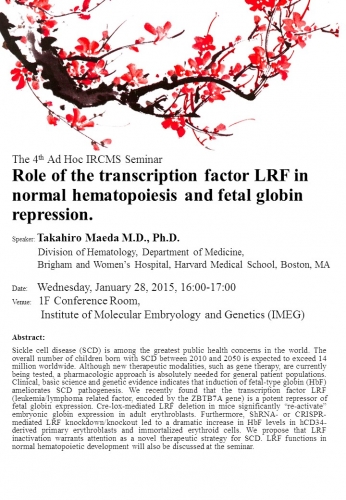IRCMS invited Dr. Takahiro Maeda from Harvard Medical School for The 4th Ad Hoc IRCMS Seminar was held on Wednesday January 28, 2015. He gave a talk for his recent research. We would like to appreciate all attendees in this seminar.
- HOME
- IRCMS Seminars
- Jan.28: The 4th Ad Hoc IRCMS Seminar, "Role of the transcription factor LRF in normal hematopoiesis ...
IRCMS Seminars
Jan.28: The 4th Ad Hoc IRCMS Seminar, "Role of the transcription factor LRF in normal hematopoiesis and fetal globin repression"
January 29 2015
Speaker: Takahiro Maeda M.D., Ph.D.
Division of Hematology, Department of Medicine,
Brigham and Women's Hospital, Harvard Medical School, Boston, MA
Date: Wednesday, January 28, 2015, 16:00-17:00
Venue: 1F Conference Room,
Institute of Molecular Embryology and Genetics (IMEG)
Abstract:
Sickle cell disease (SCD) is among the greatest public health concerns in the world. The overall number of children born with SCD between 2010 and 2050 is expected to exceed 14 million worldwide. Although new therapeutic modalities, such as gene therapy, are currently being tested, a pharmacologic approach is absolutely needed for general patient populations. Clinical, basic science and genetic evidence indicates that induction of fetal-type globin (HbF) ameliorates SCD pathogenesis. We recently found that the transcription factor LRF (leukemia/lymphoma related factor, encoded by the ZBTB7A gene) is a potent repressor of fetal globin expression. Cre-lox-mediated LRF deletion in mice significantly "re-activate" embryonic globin expression in adult erythroblasts. Furthermore, ShRNA- or CRISPR-mediated LRF knockdown/knockout led to a dramatic increase in HbF levels in hCD34-derived primary erythroblasts and immortalized erythroid cells. We propose that LRF inactivation warrants attention as a novel therapeutic strategy for SCD. LRF functions in normal hematopoietic development will also be discussed at the seminar.

